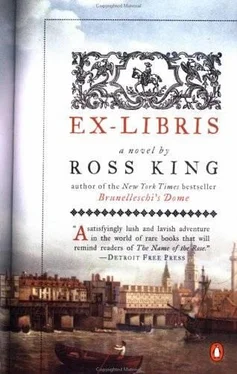I suspected, however, that many of these names and provenances were as fraudulent as the books themselves, for 1651 was the year that Cromwell sequestrated many Royalist estates, and I guessed that the contents of their libraries-or else volumes featuring their forged ex-librises-had passed through Pickvance's office. I noticed that one of the catalogues for an auction in 1654 advertised 'books once belonging to Sir George VILLIERS, Duke of BUCKINGHAM, removed from his admirable collection at York House in the Strand'. I knew that part of this 'admirable collection'-truly, one of the choicest in Europe-had been looted after the Civil War when York House was confiscated; the other half had been sold at auction a few years later when Buckingham's son, the second Duke, a Royalist, ran short of funds during his exile in Holland. But whether or not Pickvance had been selling bona fide volumes stolen from Buckingham's collection it was impossible, on the evidence of the catalogues, to discern.
My heart lurched as I looked at the dozens of titles in the York House collection. Ours was an age of great discrimination and taste, of aesthetes and collectors such as Buckingham and the late King Charles, but it was also an age of great desecration. How many treasures like those of Buckingham must have been lost to England because of our wars? Because of the Puritans and their superstitious zealotry? For when Cromwell and his cohorts weren't destroying works of art-beheading statues or tossing paintings by Rubens into the Thames-they were selling them two-a-penny to the agents of the King of Spain and Cardinal Mazarin, perhaps even to unscrupulous merchants like Dr. Pickvance. I noticed that a number of lots in Pickvance's catalogues had come from the salerooms of Antwerp, which for the past few decades had been the clearing-house from which plunder from the numerous European wars was sold at starvation prices to the greedy princes of Europe. As I reached for another volume I quailed at the task now confronting me. How on earth was I to find The Labyrinth of the World in such a mountain of other stolen volumes?
I discovered the copy of Agrippa, along with my own name, listed in the most recent catalogue, one of the first I inspected. The Magische Werke was recorded as having come from the collection in Vienna of Anton Schwarz von Steiner. But by now its more recent owner, the man who had put it up for sale in Pickvance's auction, was of much more interest to me. It was a man I had never heard of: Henry Monboddo. There was no trace of the volume's journey from von Steiner to Monboddo, so there was no way of knowing how Monboddo had acquired the volume-whether or not it had come to England via Sir Ambrose Plessington and had therefore been stolen from Pontifex Hall. The only clue to Monboddo's identity was an address, a house in Huntingdonshire, that had been pencilled into the catalogue. But there was no indication whether Monboddo was alive or-as was more often the case with the owners of auctioned books-deceased. I copied the name and address on to a piece of paper, then riffled through the rest of the catalogue, searching in vain for anything else he or his heirs might have put up for auction.
But the edition of Agrippa and even the mysterious Henry Monboddo himself were soon secondary to my purpose. I returned to the first of the volumes, that for 1651, and began working my way forward, auction by auction, year by year, wary of missing a familiar name or title that might lead to Pontifex Hall. The hours passed slowly. It was almost four o'clock by the time I reached for the last catalogue but one, that for an auction held some four months earlier:
Catalogus Variorum et insignium Librorum selectissimae Bibliothecae,
or,
A Catalogue containing a variety of ancient and modern English and French Books in Divinity,
History and Philosophy
The auction had been held at the Golden Horn on the 21 stof March, and the wares proved to be much the same as those at all of the others. I traced my finger down the next page, turned it, ran my finger down another. I was almost seeing double by now. So exhausted was I, so addled was my brain, that when I came to the entry-almost at the very back of the catalogue-I registered no shock or surprise, and I had to read it several times before I could absorb its implications:
Labyrinthus mundi , or The Labyrinth of the World . A fragment. A work of occult philosophy attributed to Hermes Trismegistus. Latin translation from Greek original. 14 manuscript pages of the finest vellum. Arabesque binding. Excellent condition. Date and provenance unknown.
Through some oversight, or perhaps because of a deliberate omission, the entry failed to record the name of the vendor. But the new owner's name-the name of the man who had purchased it four months earlier-was inscribed clearly in pencil. It was the repetition of Henry Monboddo's name as much as anything else that jolted my brain from its torpor. Studying the entry carefully, I saw that Monboddo had paid fifteen shillings for the fragment-a pittance, I thought, remembering Alethea's insistence about its value and her eagerness to pay any price to retrieve it. But it was the object of my quest, I had no doubt of that. There was no mention of an ex-libris, though the omission was hardly surprising: presumably it had been removed, either by Pickvance or the previous owner, who would not, after all, have wished to advertise the theft from Pontifex Hall.
Still, I was puzzled by the price of fifteen shillings. Had neither Pickvance nor the anonymous owner known its true value? I could not imagine Pickvance selling anything for a penny less than its worth. I therefore decided that Alethea must have been drastically wrong about the fragment. Perhaps, at fifteen shillings, it was no more valuable than anything else that Pickvance put up for sale.
I had not the courage to ask Mr. Skipper what he knew about Henry Monboddo-Alethea had insisted upon discretion, after all-and so after copying down the details of the entry I closed the volume and returned it to the stack. My step grew light as I left the building a few minutes later and began walking through Alsatia. The Gordian knot, I decided, was almost cut in two. I would find Henry Monboddo, make him a generous offer-using Alethea's money-and collect my reward. Then I would be done with the business once and for all, and I would be able to resume my peaceful and sedentary life. It had been a good day, I told myself. I believe I might actually have begun to whistle.
I was in this same mood, exhausted but sanguine, when I heard the footfalls in the corridor growing louder. I pushed myself arduously from the chair. Lady Marchamont had arrived.
***
Ten minutes later I was seated at an enormous dining-table, listening to Alethea apologise for the dire condition of Pulteney House. She had appeared in the library doorway looking like what Horace calls mentis gratissimus error , 'a most delightful hallucination'. She was dressed exactly as she had been at Pontifex Hall-the leather buskins, the dark calash-despite the warm weather. I had already decided she must have purchased Pulteney House only recently, hence the massive tomes on the table downstairs. After all, as a widow she was now a 'feme sole' according to our laws, no longer a 'feme covert'. She was therefore able to buy and sell property, even to conduct a suit in the Court of Chancery if she wished. But in fact my first suspicions proved correct, because as we climbed the stairs to the dining-room she explained how Pulteney House belonged to her 'neighbour' (as she called him) Sir Richard Overstreet, who had 'kindly' lent it to her. Pontifex Hall was no longer safe, so she had come to London for the time being: for how long she could not say. But she thought that, despite the risks, the two of us should meet to 'exchange information'.
Читать дальше












